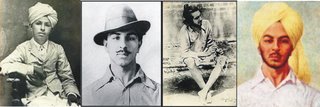Jis marne te jag dare, mere man anand
Jis marne te jag dare, mere man anand, Marne te hi paiye puran parmanand
(Death, that terrifies most in this world, is what brings me happiness
it is in Death alone that one finds eternal bliss.)
- Kabir doha recited by Bhagat Singh when conveyed the judgement on his death sentence
27 September is the birth centenary of Shaheed Bhagat Singh
(Death, that terrifies most in this world, is what brings me happiness
it is in Death alone that one finds eternal bliss.)
- Kabir doha recited by Bhagat Singh when conveyed the judgement on his death sentence
27 September is the birth centenary of Shaheed Bhagat Singh
 Picture acknowledgement: Punjab Panorama
Picture acknowledgement: Punjab PanoramaIt is may not be a false statement to assert that one hundred years after his birth, Bhagat Singh is at best a name to be remembered ritually. His brief life indeed finds a mention every year, generally on his death anniversary- 23 March, but his ideas are conveniently forgotten.
In the age of trickle down economics and when youngsters learn to balance college studies with a job in the BPO around the corner, his message is perhaps irrelevant to many of those who are in the same age group as he was when he climbed the gallows.
Bhagat Singh was 23 years 5 months and 25 days when he was hanged by the British government.
Despite Mahatma Gandhi's pacifism and opposition to capital punishment he made no attempts to stop the hanging. Some consider it to be one of the political mistakes that he made.
But it is a tribute to the young man that his pictures are the only ones, along with Dr Ambedkar, that can be found in all parts of the country today. He is owned up by the Arya Samajis as well as the Communists, by the Bollywood mucksters as well as Dalit organizations. By the Khalistanis as well as the Hindutva brigade.
It may be difficult to fully understand why Bhagat Singh, and why not Chandrasekar Azad or many of those from other movements like the Chittagong Armoury raid participants, is still given an honour that is denied to many other participants in the less pacifist strands of the Indian freedom movement.
One of these reasons is undoubtedly that Bhagat Singh personified the thinking terrorist. It is amazing to see the maturity that he brings to the table in his Why I am an Athiest? He was a vociferous reader and perhaps one of the few revolutionary leaders who read so profusely till the end.
His passionate embrace of death was underlined by a deep social commitment that envisaged an egalitarian society that went beyond the struggle for independence from British colonialism. Freedom may have come to some, but for many it is still a distant dream.
Which is why Bhagat Singh and Dr. Ambedkar can still be seen on dilapidated walls and off colour posters across the country.
A tribute to the restles revolutionary.
A previous related post.
Cross posted at: Desicritics
Tags: India, Punjab, Bhagat Singh
3 comments:
thanks for all the links bhupinder. What I admire most about Bhagat Singh is that his nationalism was not an expression of some kind of adolescent macho bravado, as perhaps is the case with many other revolutionaries. His worldview was based on seeing nation as people and not as some myth and seeing freedom as freedom from injustice and oppression not just freedom from the british rule. I think he wrote many other essays too when he was in prison. I have always wanted to read those.
I think you have put it well:
>His worldview was based on seeing nation as people and not as some myth and seeing freedom as freedom from injustice and oppression not just freedom from the british rule.
***
Rajkamal published the collection of all his writings including essays and letters many years ago. not sure if an English translation is available. I could not find many of his works on the web, even his Why I am an Athiest is only partially available.
Excellent Post.
Post a Comment